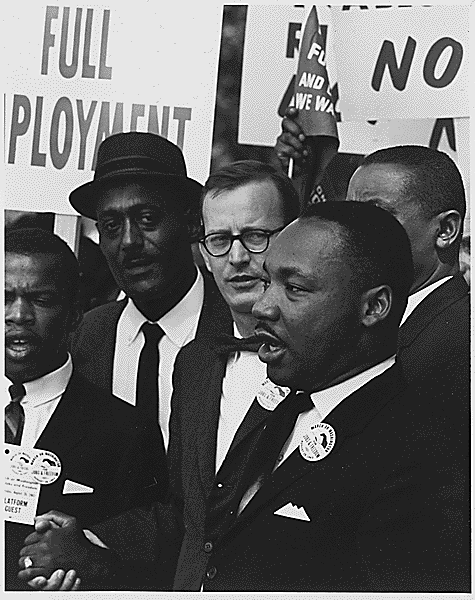
Civil Rights March on Washington, D.C. [Dr. Martin Luther King, Jr., President of the Southern Christian Leadership Conference, and Mathew Ahmann, Executive Director of the National Catholic Conference for Interrracial Justice, in a crowd.], 08/28/1963. U.S. National Archives’ Local Identifier: 306-SSM-4C(51)13
The problem with an image is that its two dimensional. Flat. Without actual, physical depth. And the problem with making someone into a symbol—much as we have done with the prolific legacy of Dr. Martin Luther King, Jr.—is that we are too often reductive in our approach, and so much depth to their story is left on the cutting room floor, so to speak.
See, the impact that Dr. King has left upon our society is undeniably profound; his name has become synonymous with peaceful yet insistent work towards justice, particularly of the racial kind.
The successes of the Civil Rights Movement are held up as evidence for the power of his brand of changemaking, proof that if we can simply endure the slings and the arrows of oppression, we can influence the world for the better. He has become the symbol of racial harmony and peace, a hero who calls for us to join hands with one another and move forward into a future of equality.
In the years since Dr. King’s assassination, however, these aspects of his work and life are too frequently all that we hear about him. Of course, there’s nothing wrong with the digestible nuggets of fairness and equality and peaceful nonviolence in and of themselves, but this leads to a safe and sanitized version of Dr. King; a distillation of him down into morality and idealism, often couched in Christian theology.
We see it in the efforts of certain politicians to use Dr. King’s dream of equality to argue that policies like affirmative action and schools of thought like critical race theory are evidence of “reverse racism.” Some take the messages of self-help and self-betterment that he preached to the Black community—in a time when there was very little recourse for community improvement other than what the community itself could do—as evidence that Black culture is inherently deficient.
Others have used King’s commitment to nonviolence as a cudgel to bash against the protests and rhetoric that have arisen in the era of America’s racial reckoning over the past few years. Still more have taken Dr. King’s resiliency towards enduring the significant and often violent opposition his work faced as proof that change is long, and we must not “rock the boat” too much on our quest for equality.
These approaches fail to capture the reality of Dr. King, and thus fail to help give us grounding and guidance when we wish to remember him. See, Dr. King was one of the most hated people in the country during the Civil Rights Movement. He was called everything from an agitator to a communist, his deeds labeled blatantly anti-American.
From the deepest South to the most industrialized North, King’s message and the movement he represented was rebuked, overlooked, and tread upon. Opposition would throw rocks at him, civil rights offices would be bombed, protestors beaten and killed.
Yet Dr. King would continue to preach the message of nonviolence, not necessarily because he didn’t believe it would be effective at instituting change, but because he sought a world where violence was no longer a thing. He spoke to the role of the government in stepping in, making right the wrongs of the past, and making whole the people who had been irrevocably harmed by it. Especially when the gap was too big for them to make up themselves.
He pushed for peace but also pondered what true “justice” would mean, lambasting moderates who preferred stable inequality over righteous disruption. Dr. King fought not only against racism but classism as well, and sought to gather all those oppressed by the unjust caste system of our country.
In his final years, Dr. King also pushed against the Vietnam War as a supremely immoral American overreach—an opinion which revealed his thinking to be radicalized far beyond the comfort zone of many of his peers, let alone those in power.
So much of this is lost in the Dr. King we celebrate today, however. There aren’t many kids reading his speeches or entering poetry contests that highlight the virtues of wealth distribution or mandatory minimum incomes. I haven’t seen any art contests on combatting imperialism or naming the genocide that happened to indigenous peoples in this country. No acts of service I’ve seen have focused on calling out the hypocrisy of those in power who insist that they are on the side of justice, but only at the pace they are comfortable with and using the methods that they approve of.
Thus, as we consider the legacy of Dr. Martin Luther King, Jr. today, I ask that we not simply rely on the diminished and defanged bit of iconography we so often reduce his fullness to. Take this time to read more about who he was and what he believed. Examine yourself for where you stand and what you can do. Hold ourselves and each other accountable for the kind of future we want to build. And honor a man whose fight still remains unfinished.
Quinton Smith is Self-Help's Vice President of Diversity, Equity, and Inclusion (DEI).